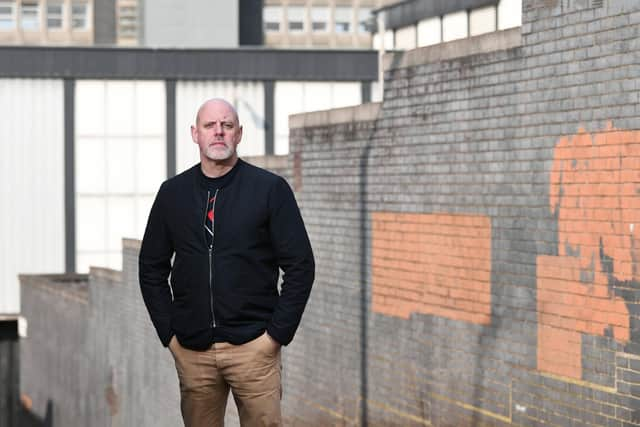Scotland's biggest promoter and head of TRNSMT says public transport is a let-down for live music fans
and live on Freeview channel 276
DF Concerts chief executive Geoff Ellis has hit out at the lack of late-night services, an inability to secure extra train carriages when major events take place and the early shutdown of Glasgow's underground on a Sunday.
Ellis, whose company owns King Tut’s Wah Wah Hut in Glasgow city centre, was speaking at a summit organised by the Night Time Industries Association (NTIA) in Scotland, which represents music venue and nightclub operators. The association heard widespread concerns about how a shortage of taxi drivers in Scotland’s city centres were affecting businesses.
Advertisement
Hide AdAdvertisement
Hide AdGlasgow-based DF had its busiest ever summer in Scotland, with 33 outdoor shows, more than a million tickets sold between June and August, and an estimated £72.4 million generated for the Scottish economy.


Mr Ellis said: “When we’re doing major events, we want people to travel by public transport. It makes it easier because there is less congestion on the roads and it is also a lot more sustainable as well.
"But you need the services to be good and you need them to be running late. The underground stops running in Glasgow at 6pm on Sundays, which is ridiculous.
"For us to try to get extra carriages on trains is nigh on impossible. They always say that they need at least a year’s notice to get the rolling stock. If you give them two years, they still can’t do it.
Advertisement
Hide AdAdvertisement
Hide Ad"When people come away from a show at Hampden, the queues are huge at Mount Florida station because the trains are just not big enough. People can be waiting for ages."


Mr Ellis said a nationwide shortage of taxi drivers was causing more problems for the nightclubbing sector than the music industry. He said: “Bus operators know with advance ticket sales for major events and bigger shows that if they put on special service they have a good chance of getting people onto them.
“The real challenge for nightclubs at the moment is over late-night buses and a shortage of cabs. But transport providers and local authorities have to work a lot harder to support the whole night-time economy and not just promoters.
"It affects bars, restaurants and hotels, as well as people putting on events. It's also about getting staff home after working late at night.”
Advertisement
Hide AdAdvertisement
Hide AdMike Grieve, chair of the NTIA in Scotland, said: “There are serious issues around transport and taxis at the moment – the situation in all our cities is pretty grim.


"It is only right for us to ask for proper solutions. This doesn’t just affect the entertainment side of the night-time economy. It affects people who work through the night in all sorts of other environments."
Mr Ellis admitted the music industry had "over-stretched" itself after Covid restrictions were lifted, but insisted ticket sales were holding up well during the cost-of-living crisis so far. He suggested younger audiences were less affected because they were used to living on “tight budgets”.
Asked about the challenges of the “post-Covid era”, Mr Ellis said: “Initially, everybody was really excited about coming back. We all probably over-stretched ourselves putting on loads of shows and events for people who couldn’t wait to get back.
Advertisement
Hide AdAdvertisement
Hide Ad"Once people had started going to gigs, clubs and festivals, the next thing they wanted to do was to start to travel and go on overseas holidays. There was some pent-up demand, but it wasn't open-ended. That kind of caught us all on the hop a bit.
“The obvious challenge now is the cost-of-living crisis. I think it’s the uncertainty as much as anything and people not knowing what their expenditure is going to be.
"We’ve seen with previous recessions that people who are relatively young and not earning large amounts of money still go out. They are skint most of the time.
"Whilst everybody might be suffering on a wider scale, for people who are used to managing on a tight budget, it’s not as different as it is for people with a mortgage and kids. For nightclubs and a lot of gigs with younger audiences, it is maybe not affecting things as much as the media are portraying. The more you come out and say everything is doom and gloom the more people think it is.
Advertisement
Hide AdAdvertisement
Hide Ad“I’m not trying to say everything is rosy in the garden, because obviously it isn’t and there are challenges.”
Frankie Elyse, one of the founders of DJ collective Polka Dot Disco Club collective, said: “The challenges for us are cutting through the noise and making our nights affordable.
"After Covid, a lot of young promoters were really excited to put on nights, but that has led to a slight over-saturation, so it’s been about how to stand out.
"We do have a target student market, especially with our mid-week events, but it is a challenge. We have been offering free entry before midnight and £5 entry afterwards, which is not a lot at all.
Advertisement
Hide AdAdvertisement
Hide Ad"As a promoter, you do need to make some sort of money to break even. But it’s also really important to us that our nights are accessible to anyone.”
Fly Events founder Tom Ketley said: “It's really important to keep tickets low and accessible. We’re actually seeing our club nights busier than ever as there is a wave of people who have never been to a nightclub before.”
Mr Ellis added: “From a concert-going point of view, people are still going out. Glasgow has never seen as many outdoor concerts as it did this summer. We put two Shania Twain shows at the Hydro on sale the other day and they sold out within an hour. People are still spending money on tickets. It’s not all doom and gloom.
"But that’s not to say any of us can be complacent or shouldn’t be concerned.”
Comment Guidelines
National World encourages reader discussion on our stories. User feedback, insights and back-and-forth exchanges add a rich layer of context to reporting. Please review our Community Guidelines before commenting.
